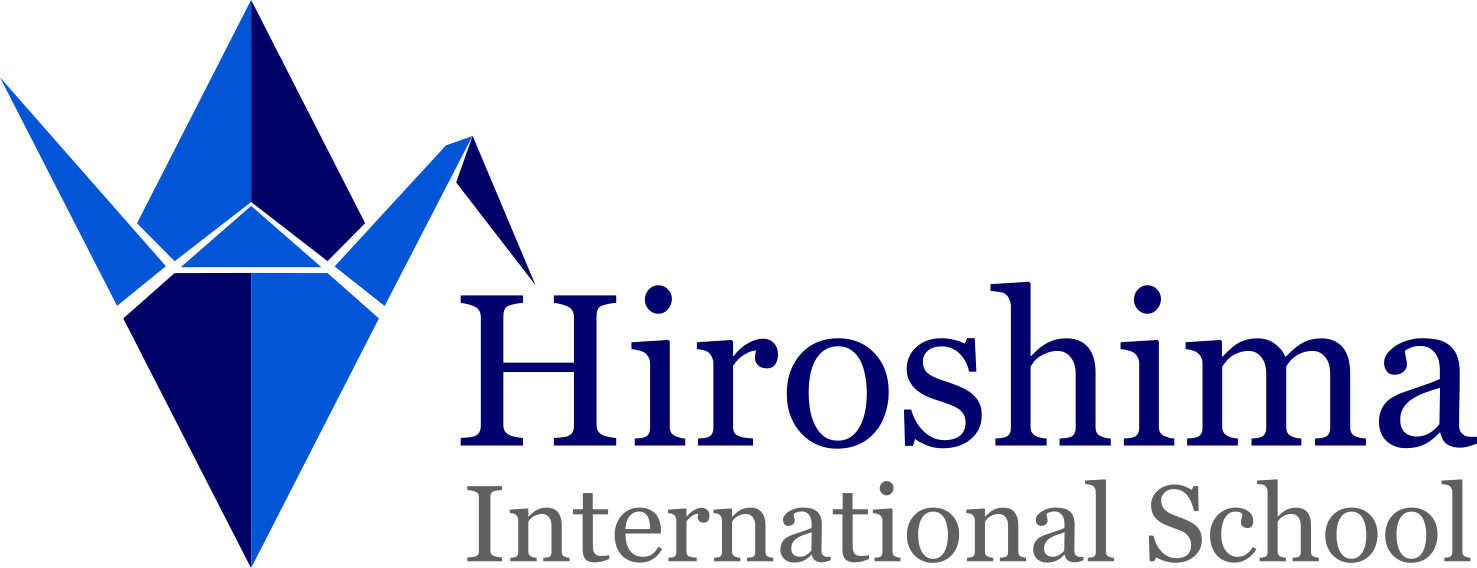ITEMS: Joe’s (Gr12) Letter to the Editor; Ayaka’s Music Award; MYP/DP Open Day; Festive Eve update.
Principal’s Message
We have a HIS Board of Trustees (BOT) coming up on Monday 9th November 2020. Thank you to everyone who is involved in this important team who helps to support HIS. The BOT is made up of a range of members of the HIS community including parents, teachers, members of the Board of Directors, and other community members with an interest in supporting HIS.
I received some questions from parent members on the BOT regarding the English and Math levels of our Primary Years Program (PYP) students. It was requested that I address these questions at the upcoming Board of Trustees meeting, however, all of your children are involved in the development of their various literacies and numeracies, so I thought it would be beneficial to share responses through this issue of the Crane.
Parent Information Sessions
Our series of parent information sessions were interrupted by COVID last year, as was many aspects of school life, although we have a schedule of eight parent workshops planned for the remainder of the school year and look forward to working with you. In the meantime, I hope the following notes are helpful.
Words of caution regarding the myth of the average
By the way, on a TED Talk, you can click the settings icon to see the translated subtitles. This one, for example, is available in English, French, Hebrew & Korean. You can also click auto-translate in a range of languages including Japanese and it is surprisingly accurate.
Many of the adults at HIS, parents and teachers alike, grew up in education systems that worshipped ‘the average’. These experiences can be powerful in shaping our world views when looking at the IB programs. Parents can experience a sort of cultural dissonance (that feeling that the world is not the way it should be when we are confronted by something that does not fit our existing world view) when experiencing some approaches to teaching and learning in the IB programs.
One of the major differences that we see is the focus on an individual child’s developmental level rather than on the child’s place relative to other children who happen to be in the class. This can be potentially unsettling for parents who experienced a very different approach in your own schooling where your own development may have been measured against the student sitting next to you.
One of the harsh realities of focusing on averages too heavily is that there always must be a below-average student. If we gathered all of the parents from a class together and asked, ‘Who wants their child to be below-average?’ not many people would raise their hand as below average has historically been associated with failure. Even if the class was filled with mathematical geniuses, there would need to be about half the class who were below average. Regardless of the developmental level of the students, we create a structure where there must be failures. This is why the focus on an individual child’s level of development is important.
What are we about at HIS(HISでは)(English & Japanese)
I have been asked to present at the Board of Trustees meeting, my thoughts on the PYP students’ Math and English levels at HIS. The answer to this question is that they are as varied as expected. We have seventy unique individuals in the PYP. They all come from very different contexts and for a variety of reasons, some students have English skills that are developing rapidly and some students have English skills that are taking longer to develop. Likewise, some of those unique individuals have Mathematics skills that are developing rapidly and some students have Mathematics skills that are taking longer to develop. All of our students have jagged Mathematics and English profiles when we look at discreet skills in Mathematics and English. Although it may be convenient to talk about overall levels of students, the oversimplification does not help us to support the individual needs of the unique and complex individuals in our classes. We need to look at a class as individuals, each with different needs.
先日、評議員会にて、HISプライマリー生徒の算数と英語のレベルについて、私の考えを発表して欲しいとの要望がありました。この質問に対する答えは、思った通りさまざまです。HISのプライマリーには、70名のユニークな生徒たちがいます。みんな育った環境も当校に通う理由も様々で、英語の上達が速い生徒もいれば、時間がかかる生徒もいます。算数のスキルについても同様の事が言えます。算数と英語のそれぞれ細分化したスキルに着目すると、HISの生徒はみんな得手不得手様々です。生徒の全般的なレベルについて語るのは簡単かもしれませんが、シンプルにし過ぎる事は、ユニークで複雑な個々のニーズのサポートに役立つとは言えません。私たちは、クラスをそれぞれ異なるニーズを持つ生徒の集まりとしてみる必要があります。
Having said this, however, we do participate in the annual International School’s Assessment (ISA) standardised testing so that we can compare our internal assessment data on individual students with an external system. This also helps us to adjust our overall program by identifying general areas that need more focus, for example.
そうは言いながらも、HISでは、個々の生徒の学内での評価を外部機関のものと比較するため、毎年インターナショナル・スクール・アセスメント標準化テスト(ISA)を行っています。これは、もっと重点的に教えるべき事柄等、一般的な領域を見極める事により、HISのプログラム全体を調整するのに役立っています。
The below International School’s Assessment (ISA) report represents a fairly typical class, not only at HIS but at all schools as groups of students are always at different developmental levels. Below is a report on Mathematical literacy from the February 2020 ISA tests, just before COVID19 came along.
下記のISAレポートは、生徒が常に異なる上達水準にいるため、HISだけでなくすべての学校での典型的な水準を表しています。これは、COVID19が発生する直前の2020年2月のISAテストからの数学的リテラシーに関するレポートです。
You can see individual student scores (an aggregate of many different Math skills) on the left-hand side represented as little dots. Each one of those is a child. Each dot has a unique story which gets lost in the graph. The blue bar labelled ‘This school’ shows a black line which is the average of this group of students. Interestingly, the average line does not align with any of our students which is what Todd Rose was explaining in the TED Talk above.
小さなドットで左側に表示されているのが、個々の生徒の得点(多くの異なる算数スキルの集計)です。ドットの一つ一つは子供です。各ドットは、グラフからは得られないユニークなストーリーを持っています。「This school」と記された青いバーの中の黒いラインは、生徒たちの平均値を示しています。興味深いことに、トッド・ローズが上記のTEDトークで説明していることで、その平均ラインは当校のどの生徒とも一致していません。
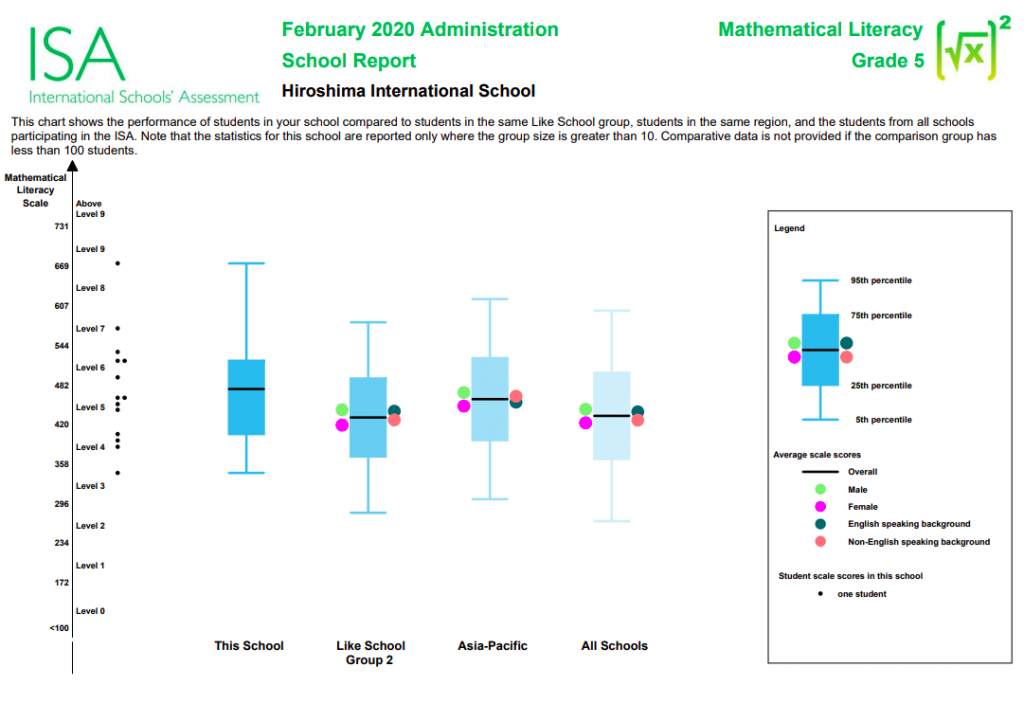
You can see this pattern repeated across classes in our 2019/2020 ISA school report.
2019-2020年度のISAのスクールレポートでは、この傾向がクラスを超えて繰り返されていることが分かります。
Here is an example of a class with fewer than ten students.
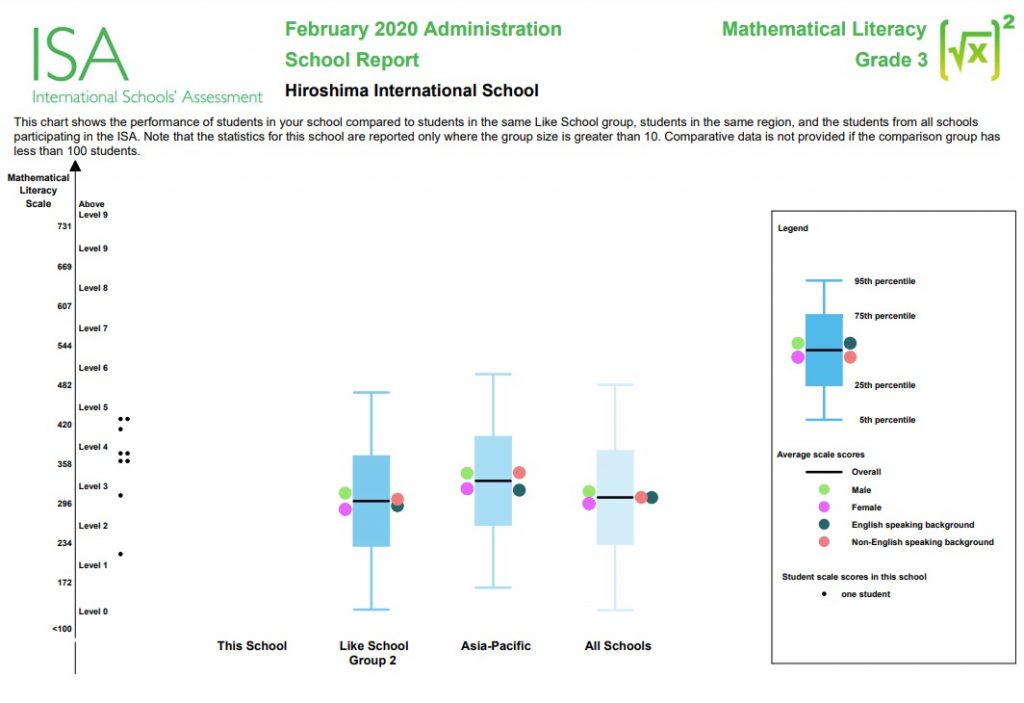
The way we use this type of data is to examine the more detailed view of each of the dots – each child. This information is contained in the ISA report that a parent receives for their own child. This helps us to support them in class with the skills that need development at their specific level.
このタイプのデータの使用方法は、各ドット(それぞれの子供)の詳細を調べることです。この詳細情報は、保護者が受け取るお子さんのISAレポートに含まれています。この情報により、子供たちに合ったレベルで、上達を必要とするスキルをクラスでサポートすることができます。
We use this external standardised assessment as well as our internal formative and summative assessment data to provide us with a clear picture of where your child is during their learning journey. Our interim and semester school report cards, as well as student-parent-teacher conferences and student-led conferences, inform parents of a child’s progress during the year.
HISでは、この外部の標準化された評価と内部のフォーマティブ(形成的)とサマティブ(総括的)評価データを使用して、学習過程においてのお子さんの位置を明確に把握します。中間成績表、学期成績表、三者面談、生徒主導の面談を通して、その年のお子さんの成長を保護者にお知らせします。
To guide our classroom instruction, we have curriculum documents such as the PYP Language and Mathematics Scope and Sequence documents available on our curriculum pages on the HIS website. We can see where students are situated relative to the knowledge and skills outlined in these documents.
学習内容をお知らせするために、PYPにおける言語と算数の学習範囲と学習する順序を示したドキュメントをHISホームページのカリキュラムページに掲載しています。これらのドキュメントで概説されている知識とスキルに関連して、生徒がどこを学習しているかをご確認いただけます。
When we look at the little dot on a report like this, we are interested in the complex array of factors that are affecting that individual’s language or mathematics development. We work to support that child where they are at that point in time. We understand very well that parents may experience certain levels of anxiety if their child’s development in a certain area does not correlate with their expectations based on their own experiences and self-perceptions. The question we need to be always asking is, ‘What does my child need at this moment in time and what are the factors that are affecting their learning, either helping or getting in the way?’
このようなレポートで小さなドットを見ると、個人の言語や算数が上達する上で影響を及ぼす複雑な要因の配列に興味が持てます。HISでは、その時に生徒がいる位置でのサポートをするよう努めています。特定の領域でのお子さんの上達が、保護者の経験と自己認識に基づく期待と相関していない場合、保護者が不安な思いをされることは重々理解しています。私たちが常に問いかけなければならない質問は、「子供が現時点で何を必要としているのか、彼らの学習に影響を与えている要因は何か、助けになるのか、邪魔になるのか?」です。
This is the questions we ask as we work to support each child in our program here at HIS. Enjoy your weekend.
HISのプログラムでは、それぞれの子どもたちをサポートするために、このような質問をしています。
Kind regards
Damian Rentoule
Crane Video
Joe’s (Gr12) Letter to the Editor
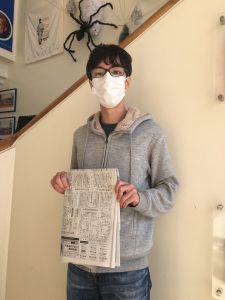
Joe wrote a great letter to the editor as part of a task in Japanese class related to the use of technology in schools which was recently published. Great work, Joe, and we look forward to some more publications!
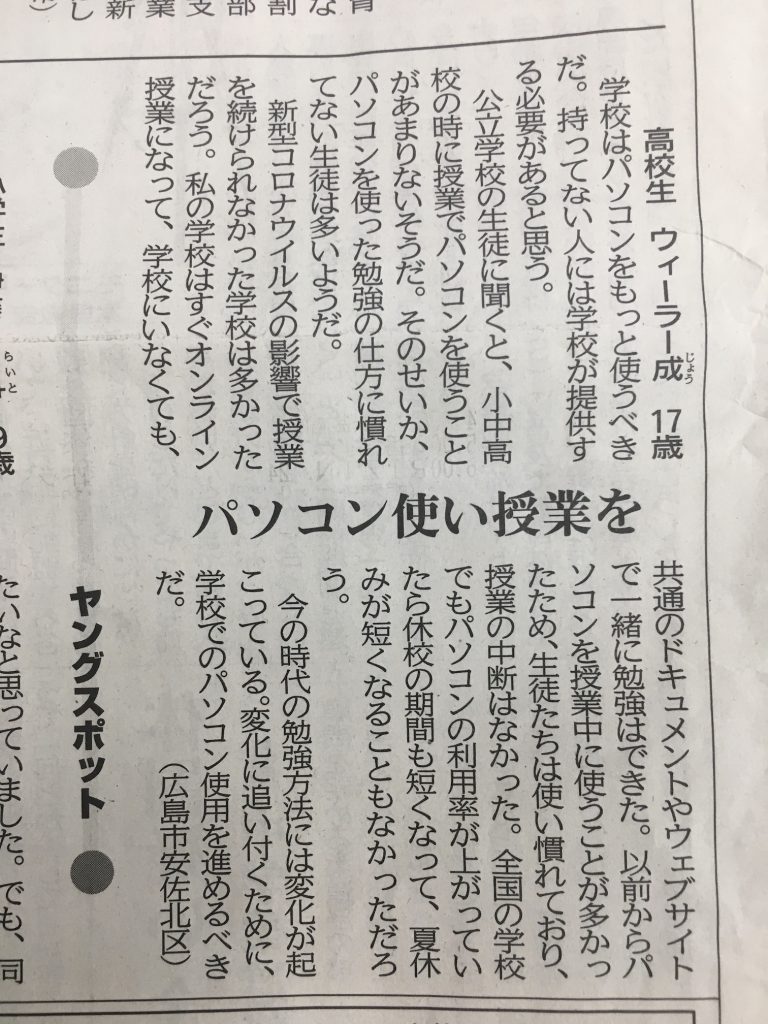
Ayaka (Gr6) Music Award
G6 Ayaka has been awarded the grand prize in the Hiroshima District round of Beten Music Competition. She will now proceed to the National competition in December. Ayaka is competing with the renowned virtuosic piece Allegro and Prelude by Kreisler. It is wonderful to see our students having such great success at these challenges they are taking on. Congratulations, Ayaka.
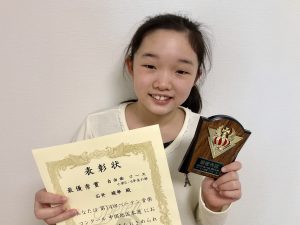
HIS Graduates at Eichi Gakuen (HIGA)
We were very proud of our HIS graduates once again. Taiga, Vivica, and Lisa visited students at Eichi Gakuen (HIGA) to talk about their IB Diploma Program experiences, especially about the Extended Essay, Theory of Knowledge and Creativity/Activity/Service. Thank you for your generous service to our wider Hiroshima community.
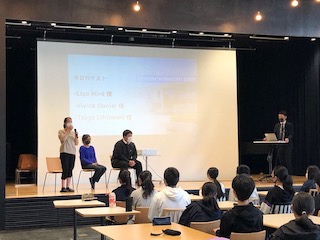
MYP/DP Open Day
The MYP/DP Open Day provides an opportunity for you to better understand the IB program that your child is in. Please join us in person or via zoom. Please review the presentations that you can attend.
Monday 9th November, 9:00 am – 12:30 pm, HIS Meeting Room or on Zoom, Japanese Translation is available, Parking available on the field.
More details & Zoom links available here:
Theory of Knowledge Webinar for Gr10/11 Parents
Dear Parents of Grade 10 and 11:
Theory of Knowledge (TOK) is a core element of the IB Diploma Program. If you would like to learn more about TOK, please join the free webinar following the link below:
https://us02web.zoom.us/webinar/register/WN_MzA5Cd9vQSWp8v7mBZWJfA
This webinar is designed to introduce TOK to parents. You will be exposed to the ideas, thinkers, and issues that are explored in TOK.
TOK Webinar: November 17, 8:00 PM Japan Time.
*When you register for the webinar, it is important to adjust the time to Japan time.
